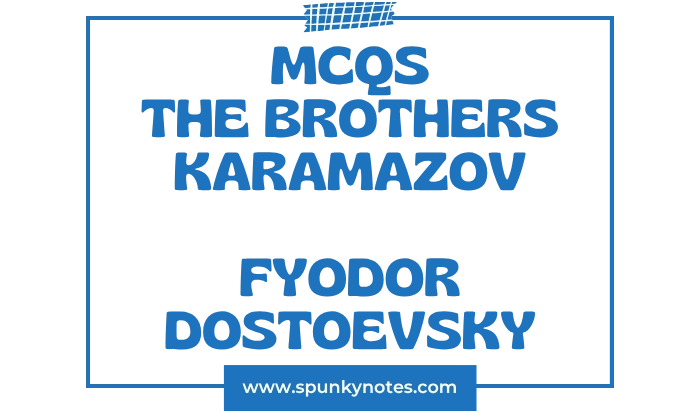

Estimated Reading Time: 16 min
The Brothers Karamazov MCQs
1. Who is the third son mentioned initially?
A. Ivan Fyodorovich
B. Dmitri Fyodorovich
C. Alexei Fyodorovich
D. Pyotr Alexandrovich
2. How much money did Fyodor Pavlovich amass?
A. Five thousand roubles
B. Ten thousand roubles
C. One hundred thousand
D. Seventy-five thousand
3. What kind of person was Fyodor Pavlovich?
A. Generous and quiet
B. Worthless and depraved
C. Scholarly and honest
D. Stúpid but shrewd
4. How long ago did Fyodor Pavlovich die?
A. Exactly ten years ago
B. Exactly thirteen years ago
C. About fifty years ago
D. Only six months ago
5. How did Alyosha’s father initially view him?
A. With open love
B. With immediate trust
C. With sullen suspicion
D. With great contempt
6. What gift did Alyosha possess in his nature?
A. Skill in mathematics
B. The gift of cunning
C. The gift of awakening love
D. Great physical strength
7. What trait made Alyosha’s schoolmates tease him?
A. His love of reading
B. His physical weakness
C. His wild modesty
D. His quiet temperament
8. Who was Alyosha’s benefactor and guardian?
A. Fyodor Pavlovich
B. Yefim Petrovich Polenov
C. Elder Zosima
D. Pyotr Miusov
9. Who impressed Alyosha and inspired him to join the monastery?
A. Pyotr Miusov
B. Fyodor Pavlovich
C. Elder Zosima
D. Father Ferapont
10. What monetary gift does Fyodor Pavlovich mention Alyosha possesses?
A. A great inheritance
B. Two thousand roubles
C. A small yearly stipend
D. Fifty thousand roubles
11. What specific question did Fyodor Pavlovich ask Alyosha about hell?
A. If it contained fire
B. If it lacked hooks
C. If the devil’s fast
D. If monks pray there
12. What time was the meeting with the elder appointed for?
A. Early morning mass
B. After the late liturgy
C. Just after dinner
D. Immediately at dawn
13. What is Pyotr Fomich Kalganov preparing to enter?
A. The monastery
B. The military academy
C. University
D. The civil service
14. What distinguished the landowner Maximov upon arrival?
A. His elegant clothes
B. His serious demeanour
C. His pop-eyed curiosity
D. His stick and book
15. What did Miusov warn Fyodor Pavlovich about before the meeting?
A. Discussing money
B. Insulting Ivan
C. Behaving properly
D. Being half drunk
16. What was the state of the furniture in the elder’s cell?
A. Rich and new
B. Crude and poor
C. Ornate and carved
D. Modern and simple
17. Who was Alyosha most surprised by during the buffoonery?
A. Miusov’s fury
B. The hieromonks
C. His brother Ivan
D. Fyodor Pavlovich
18. What did the elder advise Fyodor Pavlovich was the cause of his behavior?
A. His terrible drinking
B. His innate malice
C. Being ashamed of himself
D. His lust for money
19. Fyodor Pavlovich confessed to being a buffoon out of what emotion?
A. Pride
B. Shame
C. Joy
D. Vanity
20. What did Fyodor Pavlovich claim he experienced pleasure and beauty in?
A. Lying daily
B. Getting offended
C. Drinking cognac
D. Loving women
21. What claim did Fyodor Pavlovich make as he rushed out of the cell?
A. He was gravely ill
B. He was only testing the elder
C. He was completely sober
D. He despised the church
22. What specific question troubled the lady visitor and caused her suffering?
A. Her children’s future
B. Lack of faith in the afterlife
C. Her wealth
D. Her husband’s death
23. What would immediately cool the lady’s “active love”?
A. Physical wounds
B. Ingrained sin
C. Lack of payment
D. Ingratitude
24. What did the elder tell the lady to avoid most of all?
A. Her vivid dreams
B. All lies
C. Worldly pleasures
D. Self-contempt
25. What did Miusov exclaim in frustration during the theological debate?
A. Sheer materialism
B. Sheer Ultramontanism
C. Pagan wisdom
D. Atheistic nonsense
26. What, according to Ivan’s article, must every earthly state eventually become?
A. A free democracy
B. Nothing but the Church
C. A pagan state
D. A European society
27. Ivan suggested European liberalism confused socialism with what?
A. Paganism
B. Nihilism
C. Christianity
D. Utilitarianism
28. What idea is summarised as: “If there is no immortality of the soul, then there is no virtue, and therefore everything is permitted?”
A. Fyodor Pavlovich’s view
B. Father Paissy’s view
C. Ivan Fyodorovich’s theory
D. The Elder’s warning
29. What specific line must honest but passionate people (like Dmitri) not cross?
A. The line of honour
B. The line of poverty
C. The line of sensuality
D. The line of holding back
30. What did Rakitin identify as the defining trait of Dmitri?
A. Ambition
B. Sensualist
C. Money-grubber
D. Holy fool
31. What did Alyosha suggest Ivan was seeking instead of money or ease?
A. Power
B. Suffering
C. Fame
D. A good marriage
32. Who were the three servants living in the cottage?
A. Ivan, Marfa, Grigory
B. Grigory, Marfa, Smerdyakov
C. Fenya, Grigory, Smerdyakov
D. Yulia, Marfa, Ivan
33. What was the name of the holy fool who was Smerdyakov’s mother?
A. Fenya Ivanovna
B. Nastasia Pavlovna
C. Stinking Lizaveta
D. Marfa Ignatievna
34. Where does Dmitri state the devil struggles with God?
A. In the monastery
B. On the battlefield
C. On Earth
D. The human heart
35. Dmitri claimed that for the vast majority of people, beauty lies in what city/concept?
A. Sodom
B. Jerusalem
C. The Kingdom of Heaven
D. The Madonna
36. What was Dmitri’s initial thought (spider bite) when Katerina Ivanovna asked for money?
A. To take advantage
B. To marry her quickly
C. To confess his sins
D. To flee immediately
37. Who did Dmitri send to Katya in Moscow to help communicate with her?
A. Alyosha
B. Rakitin
C. Kuzma Samsonov
D. Ivan
38. Smerdyakov was characterised as a what type of person who stores up impressions?
A. A great reader
B. A sensualist
C. A contemplator
D. A nihilist
39. What did Ivan finally assert when asked about God and immortality?
A. There is both God and immortality
B. There is immortality only
C. Complete zero
D. Only shadows exist
40. What physical humiliation did Dmitri inflict upon Captain Snegiryov?
A. Tearing his coat
B. Seizing his beard
C. Slapping his face
D. Stealing his money
41. What did the General order his servants to do to the eight-year-old serf boy in Ivan’s story?
A. Lock him up forever
B. Torture him slowly
C. Whip him severely
D. Loose wolfhounds on him
42. What was the core idea of the First Temptation (Stones to bread) in “The Grand Inquisitor”?
A. Appealing to man’s pride
B. Buying obedience with bread
C. Rejecting false miracles
D. Seeking heavenly love
43. What is the great secret confessed by the Grand Inquisitor?
A. They follow the Pope
B. They love freedom
C. They are with the devil
D. They hate mànkind
44. How did Christ respond to the Grand Inquisitor’s long accusation?
A. With loud anger
B. By kissing the old man
C. With fiery debate
D. By weeping silently
45. What did Fyodor Pavlovich want Ivan to go to Chermashnya to do?
A. Collect timber revenue
B. Sell land quickly
C. Meet a relative
D. Deliver a message
46. What did Elder Zosima say was the most powerful force?
A. Fasting and prayer
B. Humble love
C. Absolute obedience
D. Knowledge of truth
47. Who did Dmitri first attempt to borrow 3000 roubles from before Madame Khokhlakov?
A. Katerina Ivanovna
B. Kuzma Samsonov
C. Father Zosima
D. Fyodor Pavlovich
48. What exact amount of cash was found on Dmitri when he was searched?
A. One hundred roubles
B. Three thousand roubles
C. Fifteen hundred roubles
D. Two hundred roubles
49. What central phrase did Dmitri repeat while accepting his fate as a prisoner?
A. I am a monster
B. I accept the torment
C. I am a philosopher
D. I am innocent now
50. What profession did Rakitin tell Dmitri he would pursue in Petersburg?
A. Legal defence
B. The department of criticism
C. Medicine
D. Theology
Brief Overview
The Brothers Karamazov is a novel by Fyodor Dostoevsky. It was published from 1879 to 1880 and is widely considered his masterpiece. The novel is a deep examination of philosophical questions concerning God, free will, and morality.
The plot centers on the turbulent conflicts between the wealthy, wicked father, Fyodor Pavlovich Karamazov, and his three legitimate sons. Each son represents a different intellectual or spiritual stance.
The eldest son, Dmitri (Mitya), is passionate and deeply in debt. He constantly fights his father over money and their shared desire for the sensual woman, Grushenka.
The second son, Ivan, is an educated atheist. His core philosophy states that “without God, everything is permitted.” The youngest son, Alexei (Alyosha), is a kind novice monk who tries to bring peace to the volatile family.
The tension tragically results in the murder of Fyodor Pavlovich. Dmitri is immediately arrested due to his need for money, past threats, and being found covered in blood. The actual killer is the servant Smerdyakov.
Smerdyakov confesses to Ivan that he committed the act based on Ivan’s own atheist philosophy. Smerdyakov then hangs himself. Dmitri ultimately accepts his sentence to go to Siberia, finding a new spiritual purpose through his suffering.


